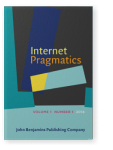“Our Chief Political Editor reads between the lines of the Chancellor’s Budget speech”
The strategic exploitation of conversational implicature in mediated political discourse
This paper examines the multilayeredness of computer-mediated political discourse, focussing on the interdependencies between the contextual constraints and requirements of the medium on the one hand, and contextualisation, indexicality of communicative action and conversational implicature on the other. Particular attention is given to implicit and entextualised references to differences between what is said and what is meant in the communicative act of follow-up, to the importation of context and provision of background information, to their function with respect to the interactional organisation of (non)credibility and argumentative (non)coherence, and to the co-construction of discourse common ground. Within the context of computer-mediated political discourse, these references are used strategically to accommodate the contextual constraints and requirements of a multilayered reception format and their multilayered felicity conditions, and to support speaker-intended interpretation of multilayered discourse on the production side.
Article outline
- 1.Introduction
- 2.The multilayeredness of mediated political discourse
- 3.Follow-ups in mediated political discourse
- 4.The Budget speech
- 4.1Data and metadata
- 4.2Data and metarepresentation
- 5.Discussion
- 6.Conclusion
- Notes
-
References
This article is currently available as a sample article.
References (42)
Atifi, Hassan, and Michel Marcoccia
Austin, John L.
1976 How to do Things with Words. Cambridge: Cambridge University Press.

Bateson, Gregory
1972 Steps to an Ecology of Mind. New York: Chandler Publishing Company.

Brown, Penelope, and Stephen C. Levinson
1987 Politeness. Some Universals in Language Usage. Cambridge: Cambridge University Press.


Chilton, Paul, and Christina Schäffner
Clayman, Steven, and John Heritage
2002 The News Interview. Cambridge: Cambridge University Press.


Fairclough, Norman
1995 Media Discourse. London: Arnold.

Fairclough, Norman
1998 “
Political discourse in the media: Analytical framework”. In
Approaches to Media Discourse, ed. by
Allan Bell, and
Peter Garret, 142–162. Oxford: Blackwell.

Fairclough, Norman
2006 Language and Globalization. Oxon: Routledge.

Fetzer, Anita
2000 “
Negotiating validity claims in political interviews.”
Text 20(4): 1–46.


Fetzer, Anita
2006 “
‘Minister, we will see how the public judges you’. Media references in political interviews.”
Journal of Pragmatics 38(2): 180–195.


Fetzer, Anita
2014 “
Conceptualizing discourse.” In
The Pragmatics of Discourse, ed. by
Klaus Schneider, and
Anne Barron, 35–61. Berlin: Mouton de Gruyter.


Fetzer, Anita
2016 “
Political interviews and responsibility: A case study of its interactional organization.” In
Responsibility in Discourse and the Discourse of Responsibility, ed. by
Jan-Ola Östman, and
Anna Solin, 163–196. Sheffield: Equinox.

Fetzer, Anita, and Varol Akman
2002 “
Contexts of social action: Guest editors’ introduction.”
Language and Communication 22(4): 391–402.


Fetzer, Anita, and Elisabeth Reber
2015 “
Quoting in political discourse: Professional talk meets ordinary postings.” In
The Pragmatics of Quoting Now and Then, ed. by
Jenny Arendholz,
Wolfram Bublitz, and
Monika Kirner-Ludwig, 97–124. Berlin: Mouton de Gruyter.


Fetzer, Anita, Elda Weizman, and Laurence N. Berlin
Goffman, Erving
1986 Frame Analysis. Boston: Northeastern University Press.

Greatbatch, David
1988 “
A turn-taking system for British news interviews.”
Language in Society 171: 401–430.


Grice, Herbert Paul
1975 “
Logic and conversation.” In
Syntax and Semantics. Vol. III, ed. by
Peter Cole, and
Jerry L. Morgan, 41–58. New York: Academic Press.

Gumperz, John J.
1996 “
The linguistic and cultural relativity of inference.” In
Rethinking Linguistic Relativity, ed. by
John J. Gumperz, and
Stephen C. Levinson, 374–406. Cambridge: Cambridge University Press.

Habermas, Jürgen
1987 Theorie des kommunikativen Handelns. Frankfurt/Main: Suhrkamp.

Heritage, John
1984 Garfinkel and Ethnomethodology. Cambridge: Polity Press.

Heritage, John
1985 “
Analysing news interviews: Aspects of the production of talk for an overhearing audience.” In
Handbook of Discourse Analysis 3: Discourse and Dialogue, ed. by
Teun A. van Dijk, 95–117. London: Academic Press.

Levinson, Stephen C.
1979 “
Activity types and language.”
Linguistics 171: 365–399.


Linell, Per
2009 Rethinking Language, Mind and World Dialogically: Interactional and Contextual Theories of Human Sense-Making. Charlotte, NC: Information Age Publishing.

Livnat, Zohar
2012 “
Follow-ups in a loose argumentative context: The pragmatic effectiveness of figurative analogy.” In
Proceedings of the ESF Strategic Workshop on Follow-Ups Across Discourse Domains: A Cross-Cultural Exploration of Their Forms and Functions, Würzburg (Germany), 31 May – 2 June 2012, ed. by
Anita Fetzer,
Elda Weizman, and
Elisabeth Reber, 165–177. Würzburg: Universität Würzburg 2012. – [online]. URL:
[URL]
Penco, Carlo
1999 “
Objective and cognitive context.” In
2nd International and Interdisciplinary Conference on Modeling and Using Context, Context’99, Proceedings, ed. by
Paolo Bouquet,
Massimo Benerecetti,
Luciano Serafini,
Patrick Brézillon, and
Francesca Castellani, 270–283. Heidelberg: Springer.


Searle, John R.
1969 Speech Acts. Cambridge: Cambridge University Press.


Sinclair, John, and Malcolm Coulthard
1975 Towards an Analysis of Discourse. Oxford: Oxford University Press.

Sperber, Dan, and Deirdre Wilson
1986 Relevance: Communication and Cognition. Oxford: Blackwell.

Weinberger, David
2011 Too Big to Know: Rethinking Knowledge Now that the Facts aren’t the Facts, Experts are Everywhere, and the Smartest person in the Room is the Room. New York: Basic Books.

Weizman, Elda, and Anita Fetzer
Cited by (3)
Cited by 3 other publications
Fetzer, Anita & Iwona Witczak-Plisiecka
2021.
Argumentative, Political and Legal Discourse. In
The Cambridge Handbook of Sociopragmatics,
► pp. 520 ff.

Xie, Chaoqun, Francisco Yus & Hartmut Haberland
[no author supplied]
2021.
Topics and Settings in Sociopragmatics. In
The Cambridge Handbook of Sociopragmatics,
► pp. 247 ff.

This list is based on CrossRef data as of 4 july 2024. Please note that it may not be complete. Sources presented here have been supplied by the respective publishers.
Any errors therein should be reported to them.
